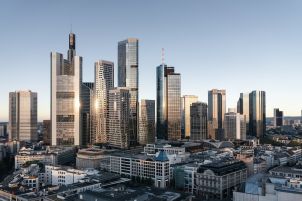Sound barrier broken: new investment record with just over 61.5 bn €
- New record result with just over 61.5 bn € (+6 %)
- Turnover driven in particular by single deals: new high of 46 bn €
- Drop in portfolio sales to 15.5 bn € (-20 %)
- Office investments again the most popular asset class with 48 % (29.7 bn €)
- New record turnover for A locations (38.65 bn €); Frankfurt, Hamburg, Düsseldorf and Stuttgart achieve all-time high
“After three very good years with a transaction volume of well over 50 bn € in each, in line with expectations the 60 bn barrier was broken for the first time in 2018 and a new all-time high was set,” explains Piotr Bienkowski, CEO of BNP Paribas Real Estate Germany. “The previous year’s exceptional result was beaten by almost 6 %. This was due primarily to investments in single properties, which, with just over 46 bn €, smashed the previous year’s record of almost 39 bn €.”
Market activity was dominated by office investments, which contributed almost 29.7 bn € and therefore 48 % to the overall result. Buyers focused in particular on single office buildings, which accounted for over 27.1 bn €. A total of 65 single deals above 100 m € were recorded. Frankfurt was way out in front, with 19 major deals registered here. In second place are retail properties, which contribute 11.2 bn € (18 %) to the result. Although this figure is slightly above the ten-year average, it is also 19 % below the previous year's result. Discount stores and supermarkets remain popular among investors, as do high-street properties in the absolute top locations. Logistics properties, on the other hand, enjoy continued success and account for 7.2 bn € (12 %), the second-best result of all time.
Single transactions contribute just over 46 bn € to the overall result and therefore account for a share of around 75 % of take-up. Portfolio deals have continued to decline in importance: with just over 15.5 bn €, the result in this market segment is down 20 % on the previous year. The share in the total volume is also the lowest for five years with 25 %. However, this is not due to a drop in interest from investors, but is due primarily to an inadequate supply.
Foreign investors account for just under 41 % of the turnover. The trend seen in the first three quarters of 2018 therefore continued with, in relative terms, a slight fall in the share of foreign buyers. European buyers were the busiest with 20 %, followed by North American investors, who contribute just under 8 % to the result.
Investors concentrated in particular on the A locations Berlin, Cologne, Düsseldorf, Frankfurt, Hamburg, Munich and Stuttgart. Together they account for just over 38.65 bn €, which equates to a share in the overall result of around 63 %. The unchallenged leader is Frankfurt: With a turnover of 10.23 bn €, a German city has exceeded the 10 bn € mark for the first time. The new record is a full 36 % above the previous year's result.
Take-up more than 4 million square metres for second year in a row
- Second-best take-up of all time; only 7 % short of the previous year's record
- Vacant space falls again across all locations by 17 %
- Rent increases continued to gather pace; both the top and average rents rose on average by 7 %
“The German office markets remain in top shape. With a take-up of around 4.02 million m², the second-best result of all time was achieved and the 4 million m² mark was passed for the second time in a row” explains Riza Demirci, Managing Director of BNP Paribas Real Estate Deutschland and Head of National Office Advisory.
The take-ups achieved in most locations are among the top 2 or 3 results of all time. Munich is again the unchallenged number one with 975,000 m² (-2 %). In second place is Berlin with 831,000 m² (-9 %). It remains the case that many property searches in the capital of Germany are unsuccessful due to the inadequate supply, the result therefore does not entirely reflect the high level of demand. With 678,000 m² (-15 %), Frankfurt achieves its second-best figure in the last 15 years, although this is well below the previous year’s exceptional result.
The amount of vacant space continues to reduce. Across all of the cities included, the total volume reduced again in the past year by just over 17% and is now, with 4.04 million m², only at the level of an annual take-up. Lower levels of vacant space were only recorded in 2000 and 2001 as a consequence of the new economy boom. The biggest reductions among the major cities are seen in Munich (489,000 m²; -28 %) and Berlin (327,000 m²; -17 %).
The very good take-up due to the strong demand at the same time as the reduction in supply has been reflected for some time in rising rents. This trend gathered pace once again in the past year. Top rents have increased on average across all locations by 7 %. The biggest increase was recorded in Cologne to 24 €/m² (+10 %), this being due to the ever-decreasing supply. In Cologne only 23 % of all vacant space is of a modern quality. Rents also rose very significantly in Hamburg (29 €/m²) and Berlin (36 €/m²), in each case by just over 9 %.
- Amira TAHIROVIC




